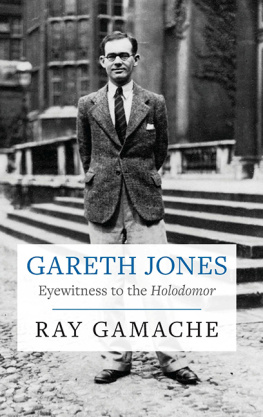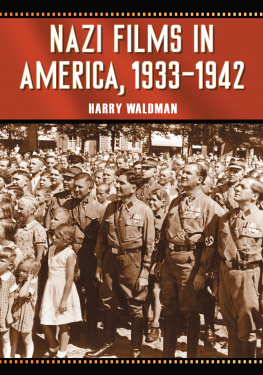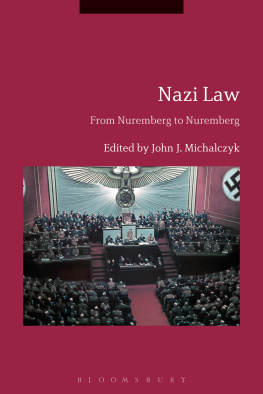Nazi Ideology before 1933
A Documentation
Introduced and translated by
Barbara Miller Lane and Leila J. Rupp
University of Texas Press Austin
International Standard Book Number 0-292-75512-0
utpress.utexas.edu/index.php/rp-form
Library of Congress Catalog Card Number 78-408
Library ebook ISBN: 978-1-4773-0446-4
Individual ebook ISBN: 978-1-4773-0447-1
DOI: 10.7560/755123
Copyright 1978 by the University of Texas Press
All rights reserved
Contents
Men!
Dietrich Eckart
The Twister
Dietrich Eckart
The Russian Jewish Revolution
Alfred Rosenberg
Jewishness in and around Us: Fundamental Reflections
Dietrich Eckart
Manifesto for Breaking the Bondage of Interest
Gottfried Feder
To All Working People!
Dietrich Eckart
The Social State
Gottfried Feder
The Protocols of the Elders of Zion and Jewish World Policy
Alfred Rosenberg
The Folkish Idea of State
Alfred Rosenberg
National Socialism or Bolshevism?
Joseph Goebbels
The Radicalizing of Socialism
Joseph Goebbels
Draft of a Comprehensive Program of National Socialism
Gregor Strasser, Joseph Goebbels, and others
Thoughts about the Tasks of the Future
Gregor Strasser
Farmer, Wake Up!
Heinrich Himmler
From Revolt to Revolution
Gregor Strasser
National Socialism and the State
Otto Strasser
The Peasantry as the Key to Understanding the Nordic Race
R. W. Darr
The Fourteen Theses of the German Revolution
Otto Strasser
Marriage Laws and the Principles of Breeding
R. W. Darr
German Freedom as the Prerequisite of Folk Culture
Alfred Rosenberg
The Nature and Aim of the National Socialist Idea
Gregor Strasser
The Farmers and the State
R. W. Darr
Work and Bread!
Gregor Strasser
We are jointly responsible for the selection and translation of the documents, for the critical apparatus, for the descriptive notes, and for the second part of the Introduction, called The Documents. The first part, Nazi Ideology, was written by Barbara Miller Lane and published in Central European History, vol. 7, no. 1 (March 1974), pp. 330. It is reproduced here with only very slight modifications; the authors thank the editors of the journal for permission to reprint it.
We wish also to thank Volcker Witte, whose rough literal translations of all the selections were very helpful, since German is not a native language for either of us; and Christina Welti and Carol Patterson, who carefully searched the pages of the Vlkischer Beobachter up to 1933 for articles by the writers included here and for treatment of the major themes raised by these writers. Barbara Miller Lane was greatly aided in the initial phases of research by a grant from the American Council of Learned Societies (196768); Leila Rupps work was facilitated by the Federal Work-Study Program in the summer of 1974. The staff of the Miriam Coffin Canaday Library at Bryn Mawr College has repeatedly extended itself in helping us to obtain varying editions of the works from which we have selected. And finally we thank our colleagues and friends at Bryn Mawr College for their cheerful help with obscure passages and quotations, and for their patient interest in a work whose subject matter is so often repugnant. Any errors, of course, are our own.
Nazi Ideology: Some Unfinished Business
During the last ten years historians have begun to reinterpret nearly every aspect of Nazi history. Many of their conclusions are very fruitful indeed. But there has as yet appeared no satisfactory reinterpretation of Nazi ideology. The study of Nazi ideology presents some apparently intractable problems; many scholars believe, moreover, that political thought played a relatively unimportant part in the rise (and fall) of the Third Reich. For these and other reasons, some of the most important source material for the study of Nazi ideology has been almost totally neglected. This is the large quantity of writings and programs published by the various Nazi leaders before 1933.
Before 1933 the Nazi Party published three major programs-the Twenty-Five Points, the agricultural program of 1930, the full employment program of 1932-and many minor programs for the partys suborganizations. The party publishing houses-Eher and the Kampf-Verlag-issued dozens of books and pamphlets, some by Hitler, but most by other party leaders. Of these other leaders, the most prolific were Dietrich Eckart, Gottfried Feder, Alfred Rosenberg, Gregor and Otto Strasser, and Richard Walther Darr. The many party newspapers and journals, which included the Vlkischer Beobachter, the NS-Briefe, the Strasser newspapers, Der Angriff, and the NS-Monatshefte, published the programs, together with many theoretical writings. In addition to the papers and magazines published by the party itself, Eckart, Feder, Rosenberg, and Darr edited journals for nonparty publishers; these journals must, because of the political position of their editors, have seemed to contemporaries to express a Nazi Party line. The speeches, of Hitler and of the other party leaders, are far less accessible; few were published before 1933, and the collections published after 1933 are not always trustworthy.it ought to have been possible to decide what his personal contribution to Nazi ideology really was.
That this task has never been attempted in any systematic way is one of the more peculiar omissions in Nazi historiography. There is of course an enormous literature on Hitler, but those studies which credit him with ideas (and most do not) tend to concentrate either on Mein Kampf, on the so-called Secret Book, or on his writings and speeches after 1933.
The reasons for scholarly neglect of the programs and publications of the period before 1933 should probably be sought in the enduring impact of some of the earliest studies of the Nazis, those for example of Frederick Schuman, Konrad Heiden, or Erich Fromm. The ways in which such early studies of Nazi history have influenced later scholars are far too complex to analyze here. It is evident, however, that the pattern of interpretation has remained much the same for forty years.
It is, I think, the proper time to begin again; to study Nazi ideology comprehensively and without the preconceptions which have
Where possible I will attempt to relate their thought to what is known of Hitlers, but I will not offer any sizable reinterpretations of Hitlers ideas. Hitlers few published works from this period have already been studied enough; a realistic appraisal of his thought must await the thorough examination of those hundreds of his speeches which he apparently chose not to publish. It is important to realize, however, that anything published by the party presses before 1933 either had Hitlers tacit approval or appeared to have it.
If one approaches the study of Nazi ideology without preconceptions, some useful observations can be made at the outset. Most of the Nazi leaders set forth a great deal of political theory in the period before 1933. The major ideas of each are quite distinctive, but there were significant shifts of emphasis and even of opinion for each throughout the period before 1933. Sometimes these shifts resulted from external political circumstances, sometimes they represented a response to the emergence of a new idea or writer in official publications. To a great extent the Nazi leaders wrote in competition with one another. While it may not always be clear whose favor they were courting (Hitler, a party following, the general public?), they clearly thought it necessary to publish in quantity, as a means to personal power within the party, or as a means of increasing the power of the party within the nation. Thus Nazi ideology, before 1933 at least, was obviously not a consistent whole, but a doctrine in the process of rapid development, into which new ideas were continually introduced. To trace this development it is necessary to study the writings, in every kind of publication, of the major political theorists within the party; and it is just as important to trace the interaction of these men and their ideas.









